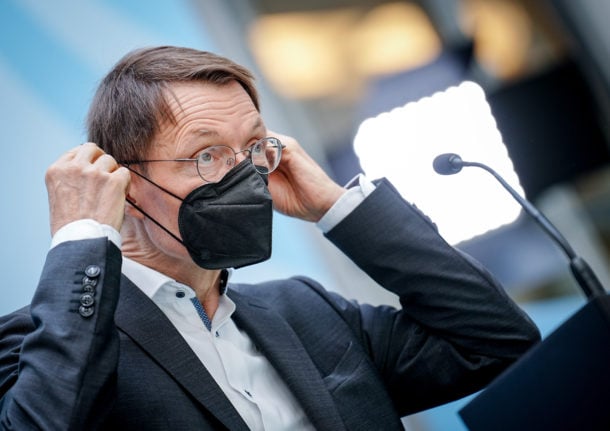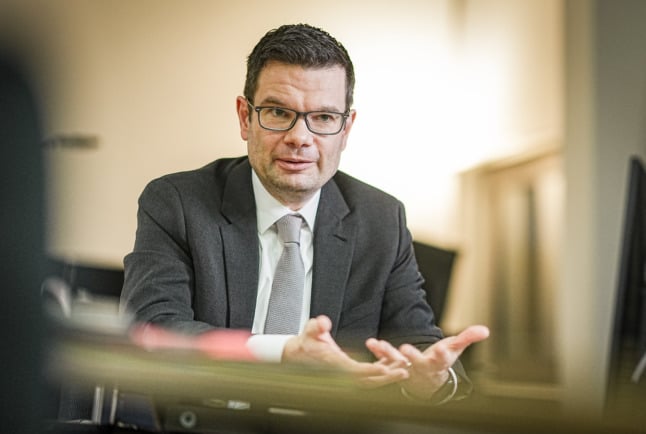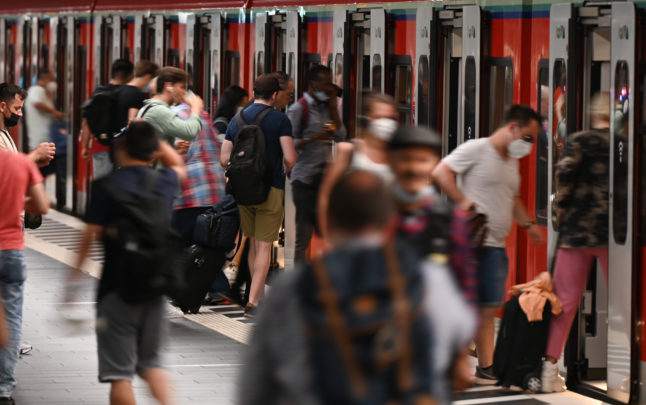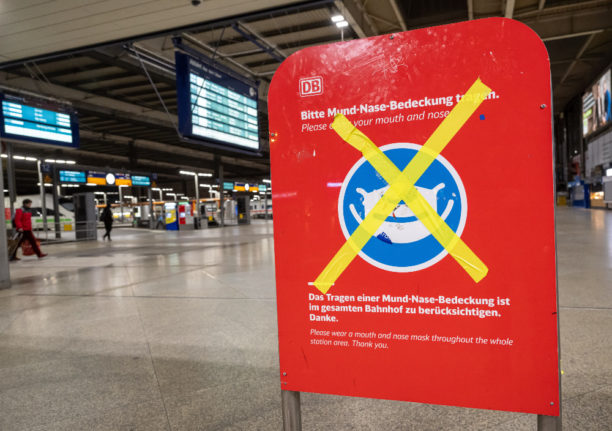The German government has prepared a graduated plan to try and limit the spread of Covid-19 this autumn. Under the new draft Infection Protection Act, states will be allowed to put in place certain rules to protect the population against Covid, from October.
It was unveiled by the Health Ministry and Justice Ministry on Wednesday.
Among the plans are for masks to remain compulsory in long-distance transport and in hospitals. They could also be made compulsory in other indoor areas, such as restaurants, but usually with exceptions for those who are recently vaccinated, recovered or tested.
“If the number of cases rises sharply – masks (can also be enforced) outdoors where distances are not sufficient, and upper limits indoors,” said Health Minister Karl Lauterbach, of the Social Democrats, in a tweet where he showcased the plans.
Der Entwurf für neues Infektionsschutzgesetz ist fertig. FFP2 Masken im Innenraum von Anfang an. Ausnahme: Nachweis Tests, frische Impfung oder frisch Genesen in Gastro oder ähnlich. Wenn Fallzahl stark steigt: Masken auch draußen wo Abstände nicht reichen und Obergrenzen drinnen pic.twitter.com/7JQRxWlOBL
— Prof. Karl Lauterbach (@Karl_Lauterbach) August 3, 2022
How long will the law be in place?
The current Infection Protection Act runs out on September 23rd. The new laws, which form the legal basis for Covid-19 measures in Germany, will apply from October 1st to April 7th 2023.
READ ALSO: Masks and tests: The Covid rules that tourists to Germany should know about
What are the draft plans?
As shown above in the diagram tweeted by the Health Minister in German, the rules have been divided into “”winter tyres” (Winterreifen) and “snow chains” (Schneeketten), which is meant to represent possible different stages.
There are rules that will apply to the whole of Germany during the autumn/winter and early spring, certain measures that states can bring in, and the option for tougher restrictions if the situation worsens.
Nationwide protective measures from October 1st 2022 to April 7th 2023:
– Mandatory FFP2 masks on airplanes and on long-distance public transport.
– Mandatory masks and testing for access to hospitals and similar facilities, as well as for employees.
– Exceptions to the requirement to provide proof of testing are envisaged for recently vaccinated and recovered people, as well as for people who are being treated in the respective facilities or service providers.
– Exemptions from the mask requirement are provided for some people receiving treatment, for children under six, for people who can’t wear a mask for medical reasons, and for deaf and hard of hearing people.

Optional tougher measures for states:
Under the draft plan, states can take additional measures if the pandemic situation requires. These include:
– Mandatory masks on public and regional transport.
– Mandatory masks in indoor spaces such as restaurants and cultural facilities. However, the plans envisage exceptions for people who have tested negatively against Covid, or who have been vaccinated or recently recovered. This could mean that the so-called ‘3G rule’ returns.
– Compulsory testing and/or masks in certain communal facilities (such as shelters for asylum seekers and children’s homes). Compulsory masks in schools would only apply to pupils from the fifth school year onwards.
Extreme measures when situation is critical:
State parliaments can enact even stricter measures if there is a threat of the health system or critical infrastructure becoming overburdened. These include:
– Compulsory wearing of masks indoors – and even outdoors if the minimum distance of 1.5 metre cannot be maintained. An exemption for recently vaccinated, tested or recovered people wouldn’t apply.
– Mandatory health and safety plans (such as disinfectants and ventilation) for businesses and events in the recreational, cultural and sports sectors.
– Ordering a minimum distance of 1.5 m in public spaces and at outdoor events.
– Upper limits for participants at events in indoor areas.
What else should I know?
Justice Minister Marco Buschmann, of the Free Democrats, said it was important that Germany would not see further lockdowns, but that masks were a key part of the plan.
“There should only be restrictions on freedom if they are necessary,” said Buschmann. “Our concept therefore rejects lockdowns and curfews.
“Instead, we rely on measures that are both effective and reasonable. Masks protect. And in certain situations, mandatory masks are also reasonable.

“That is why masks will be compulsory in hospitals and nursing homes as well as in long-distance transport. If the pandemic situation so requires, the states can also order compulsory masks for other areas of public life indoors. In culture, leisure, sport and gastronomy, however, there must be exceptions for tested, newly vaccinated and newly recovered persons.”
Buschmann said Germany was also relying on “individual responsibility of civil society – as most other European states do”.
He added that the government was paying “special attention” to schools.
“Children have a right to school education, and a school day that is as carefree as possible,” he said. “Therefore, there must be no school closures. A blanket obligation to wear masks in schools would also not be appropriate.”
What happens next?
The Cabinet will take a look at the proposals before the final draft goes to the Bundestag to be voted on.



 Please whitelist us to continue reading.
Please whitelist us to continue reading.
They shouldn’t make any kids where masks, even older ones. Pointless and abusive.
Wear. 🙂